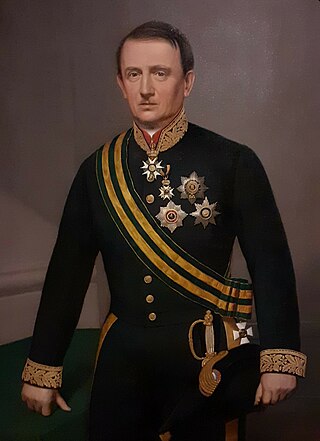| |||||
| Decades: | |||||
|---|---|---|---|---|---|
| See also: | |||||
The following lists events that happened during 2008 in the Grand Duchy of Luxembourg.
| |||||
| Decades: | |||||
|---|---|---|---|---|---|
| See also: | |||||
The following lists events that happened during 2008 in the Grand Duchy of Luxembourg.
Luxembourg is a parliamentary representative democratic monarchy, whereby the prime minister is the head of government, and the multi-party system. Executive power is under the constitution of 1868, as amended, exercised by the government, by the grand duke and the Council of Government (cabinet), which consists of a prime minister and several other ministers. Usually, the prime minister is the leader of the political party or coalition of parties having the most seats in parliament. Legislative power is vested in both the government and parliament. The judiciary is independent of the executive and the legislature.

Henri is Grand Duke of Luxembourg, reigning since 2000. He is the eldest son of Grand Duke Jean and Princess Joséphine-Charlotte of Belgium, as well as a first cousin of King Philippe of Belgium. In 2019, his net worth was estimated around US$4 billion.
Same-sex marriage has been legal in Luxembourg since 1 January 2015. A bill for the legalisation of same-sex marriages was enacted by the Chamber of Deputies on 18 June 2014 and signed into law by Grand Duke Henri on 4 July. Polling suggests that a majority of Luxembourgers support the legal recognition of same-sex marriage. Luxembourg was the last Benelux country, the tenth in Europe and the sixteenth in the world to allow same-sex couples to marry nationwide.

The Chamber of Deputies, abbreviated to the Chamber, is the unicameral national legislature of Luxembourg. The metonym Krautmaart is sometimes used for the Chamber, after the square on which the Hôtel de la Chambre is located.

Baron Victor de Tornaco was a Luxembourgish politician. An Orangist, he was the fourth prime minister of Luxembourg, serving for seven years, from 26 September 1860 until 3 December 1867.
The following lists events that happened during 2005 in the Grand Duchy of Luxembourg.

The Constitution of Luxembourg is the supreme law of the Grand Duchy of Luxembourg. The modern constitution was adopted on 17 October 1868.

The Benelux Parliament is one of the institutions of the Benelux economic union. The Parliament was established by an agreement signed by Belgium, the Netherlands and Luxembourg on 5 November 1955, which means it had already existed for three years when the Benelux Union was signed on 3 February 1958. The Benelux Parliament provides the governments with advice on economic and cross-frontier cooperation. Its recommendations may also concern other matters if common interests or current events so dictate. The parliament also keeps the three governments informed about the opinions that move in the parliamentary assemblies from which its members originate.

The first Juncker–Asselborn Government was the government of Luxembourg between 31 July 2004 and 23 July 2009. It was led by, and named after, Prime Minister Jean-Claude Juncker and Deputy Prime Minister Jean Asselborn.
The 2008–2009 Belgian financial crisis is a major financial crisis that hit Belgium from mid-2008 onwards. Two of the country's largest banks – Fortis and Dexia – started to face severe problems, exacerbated by the financial problems hitting other banks around the world. The value of their stocks plunged. The government managed the situation by bailouts, selling off or nationalizing banks, providing bank guarantees and extending the deposit insurance. Eventually Fortis was split into two parts. The Dutch part was nationalized, while the Belgian part was sold to the French bank BNP Paribas. Dexia group was dismantled, Dexia Bank Belgium was nationalized.
The following lists events that happened during 2009 in the Grand Duchy of Luxembourg.
The Constituent Assembly of Luxembourg was a constituent assembly called in 1848 in Luxembourg to write and pass a new national constitution.

The Luxembourg coup of 1856, also called the putsch of 1856, was a reactionary revision of Luxembourg's constitution on 27 November 1856. Whilst not a true coup d'état or revolution, its detractors dubbed it a "royal coup", as the reigning Grand Duke of Luxembourg, William III, greatly expanded his powers, and the name has stuck. Aimed at reversing the liberal successes embodied in the 1848 constitution, the major changes enacted by William were undone with the promulgation of a new constitution in 1868, after the Luxembourg Crisis. However, some changes have lasted, such as the creation of the Council of State.
The following lists events that happened during 1948 in the Grand Duchy of Luxembourg.

The Luxembourgish government in exile, also known as the Luxembourgish government in London, was the government in exile of Luxembourg during the Second World War. The government was based in London between 1940 and 1944, while Luxembourg was occupied by Nazi Germany. It was led by Pierre Dupong, and also included three other Ministers. The head of state, Grand Duchess Charlotte, also escaped from Luxembourg after the occupation. The government was bipartite, including two members from both the Party of the Right (PD) and the Socialist Workers' Party (LSAP).

The Tornaco Ministry was in office in Luxembourg from 26 September 1860 until 3 December 1867. It was reshuffled six times.

The Willmar Ministry was in office in Luxembourg from 2 December 1848 to 23 September 1853.
The Assembly of Estates was the legislature of Luxembourg from 1841 to 1848, and again from 1856 to 1868.

Tudor is a lead-acid battery brand founded by Henri Tudor in 1890 and is now owned by Exide Technologies.
The Law on euthanasia and assisted suicide is a law that came into force in 2009 in Luxembourg, legalising euthanasia.